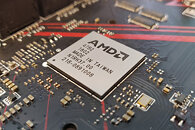Friday, March 12th 2021

AMD Fixes Intermittent USB Connectivity Issues on 500 Series Chipsets, BIOS Update Arrives in April
AMD has four weeks ago acknowledged that there was a problem with 500 series motherboard chipsets. The problem has occurred with a few chipset functions like USB connectivity, USB 2.0 audio crackling (e.g. DAC/AMP combos), and USB/PCIe Gen 4 exclusion. To fix these problems, consumers were forced to either put up with problems or lower the PCIe standard from Gen 4 to Gen 3 and switch USB protocol revision from 3.0 to 2.0. This of course wasn't the ideal solution, especially for bandwidth-heavy applications. Users have submitted many reports to AMD, and the company appears to have found a root cause of these issues. AMD has published a Reddit thread, that reports that the company found a solution to the problem and that we are going to see a fix for it in a form in AGESA BIOS update.
Source:
AMD Subreddit
AMD RedditAMD has prepared AGESA 1.2.0.2 to deploy this update, and we plan to distribute 1.2.0.2 to our motherboard partners for integration in about a week. Customers can expect downloadable BIOSes containing AGESA 1.2.0.2 to begin with beta updates in early April. The exact update schedule for your system will depend on the test and implementation schedule for your vendor and specific motherboard model. If you continue to experience intermittent USB connectivity issues after updating your system to AGESA 1.2.0.2, we encourage you to download the standalone AMD Bug Report Tool and open a ticket with AMD Customer Support.

107 Comments on AMD Fixes Intermittent USB Connectivity Issues on 500 Series Chipsets, BIOS Update Arrives in April
It just seems like they're not going the extra distance when it comes to consumer parts. E.g. Intel develops XMP to ensure memory faster than JEDEC specs works with their CPUs, whereas AMD simply lists faster speeds as "overclocks" and lets you play the mix and match game.
The modules i'm using have a XMP profile on them and the motherboard knows how to read it.
And the end result is most definitely not the same, as attested by the countless threads by poor sobs that can't run their modules at advertised speeds, because they run an AMD CPU. With Intel, XMP works out of the box in >90% of the cases. For the rest, you just dial the profiles in manually and you're good. With AMD, if you don't have an Asus board or DOCP doesn't work, you need to guess what ICs your DIMMs use, fire up a 3rd party utility, get some timings and dial those in. And even that doesn't always work and then you come to TPU complaining only to be told "dude, your RAM is not on the mobo's QVL".